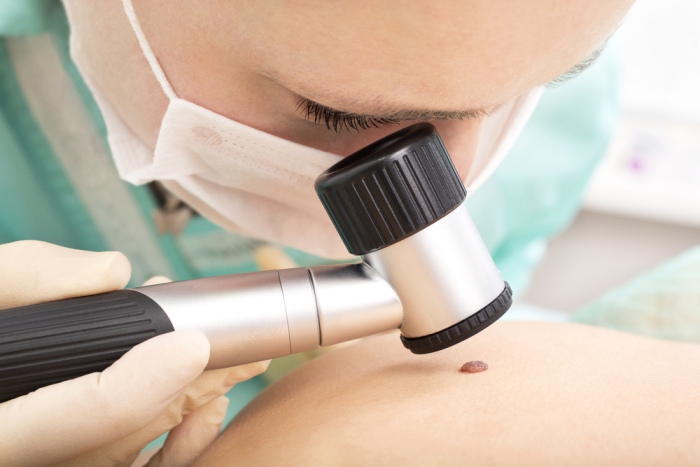Skin Cancer
Skin Dermatologists on Harley Street
The Devonshire Clinic is a private skin cancer clinic in central London. Our medical dermatologists offer private skin cancer treatments.
Skin cancer can arise anywhere on the skin; however, it most commonly occurs on the parts of the body that are more exposed to sunlight such as the face, hands, neck, and arms. Even though it is one of the most common cancers, skin cancer is not usually life threatening because when detected early, it can be successfully treated.
At The Devonshire Clinic, our dermatologists specialise in skin cancer diagnosis and provide effective treatment solutions.
What is Skin Cancer
Diagnosing Skin Cancer
Skin Cancer Treatments

Skin Cancer Treatments
Mohs Micrographic Surgery
Mohs micrographic surgery involves the removal of cancerous tissue from the tumour, then the immediate examination [...]
Read MorePhotodynamic Therapy (PDT) London
Photodynamic therapy (PDT) is an advanced technique for treating some types of skin cancer and skin conditions that[...]
Read MoreMole Removal in London
If you have a mole that has grown, changed colour or started to bleed or weep, your dermatologist may advise that i[...]
Read MoreSkin Cancer Surgery on Harley Street, London
Surgery is usually the primary treatment for skin cancer. Skin surgery is used to take samples for biopsy and it ca[...]
Read MoreEnquire about Skin Cancer
Non melanoma skin cancer
Our Dermatology Specialists
Our team of skin specialists at our dermatology clinic in London have many years of experience in treating patients with skin conditions. We understand your issues and aim to tailor our service so that you feel comfortable and reassured. Learn more about our dermatology consultants below.
Dr Conal Perrett
Consultant Dermatologist
& Dermatological Surgeon
Dr Conal Perrett is a leading Consultant Dermatologist & Dermatologic Surgeon practising at The Devonshire Clinic. Dr Perrett has expertise in general Dermatology and a specialist interest in skin cancer and skin surgery, utilising the most advanced high-tech equipment and techniques, including Photodynamic therapy (PDT), lasers and Mohs micrographic surgery.
Dr Jane McGregor
Consultant Dermatologist
For over 30 years, Dr Jane McGregor has provided expert dermatological care to patients. She has expertise in photobiology, skin cancer, sun allergy and dermatology. Dr Jane McGregor is an internationally recognised specialist in her field of skin cancer and skin disease for organ transplant recipients.
Dr Ian Logan
Consultant Dermatologist and Dermatological Surgeon
Dr Ian Logan specialises in skin lesion diagnosis and removal, skin cancer, skin surgery, Mohs micrographic surgery and general dermatology. Dr Ian Logan has received higher specialist training after completing a fellowship in Mohs Surgery and Advanced Dermatological Surgery at Cambridge University Hospitals NHS Trust.
Professor Christopher Griffiths
Professor of Dermatology
Chris Griffiths is Adjunct Professor of Dermatology, King’s College London, Consultant Dermatologist, King’s College Hospital and Emeritus Professor of Dermatology University of Manchester. He qualified in medicine from St Thomas’ Hospital Medical School and trained in dermatology in London and Michigan.
Dr Elizabeth Kulakov
Consultant Dermatologist and Dermatological Surgeon
Dr Elizabeth Kulakov is the Skin Cancer Lead at University College London Hospital NHS Trust. Dr Elizabeth Kulakov specialises in skin cancer, skin surgery, Mohs micrographic surgery and general dermatology.
Dr. Carolina Fernandez
Consultant Dermatologist
Dr. Carolina Fernandez is a consultant dermatologist affiliated with Imperial College Healthcare NHS Trust. She graduated from Imperial College London Medical School, where she obtained her medical degree in 2009.
Dr Rachel Sidwell
Consultant Dermatologist
Dr Rachel Sidwell is a highly experienced Consultant Dermatologist. Whilst she consults on all skin issues including skin cancers and general Dermatology, she has special expertise in paediatric dermatology.
Dr James Wilson
Consultant Clinical Oncologist
Receiving a cancer diagnosis can be overwhelming. You need somebody you can trust to guide you through the many investigations needed and get you to treatment as soon as possible. We will define your treatment plan together – whether our goal is cure, or to enhance the quality of your life.
Shahme Farook
Consultant Head and Neck/Reconstruction and Oral and Maxillofacial Surgeon
Shahme Farook is a Consultant Head and Neck/Reconstruction and Oral and Maxillofacial Surgeon at Northwick Park Hospital.
Dr Daniel O’Driscoll
Consultant Dermatologist
Dr Daniel O’Driscoll is a consultant dermatologist with an NHS practice at Hammersmith Hospital, part of Imperial Healthcare NHS Trust. He trained at Oxford University Medical School, undertaking an intercalated MA in Medical Sciences.
When you are faced with difficult medical choices or uncertainty and you want clarity about your diagnosis and the treatment that you will receive, then getting a second opinion from a private doctor can help put your mind at rest.